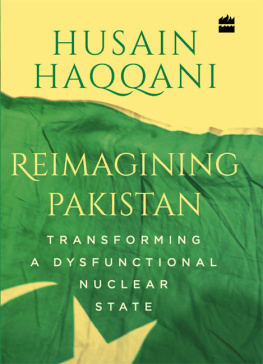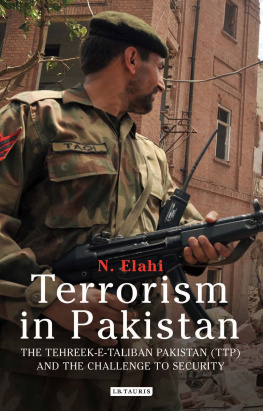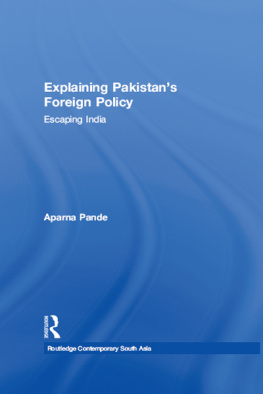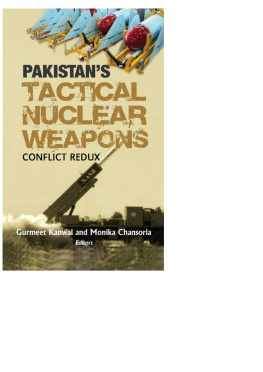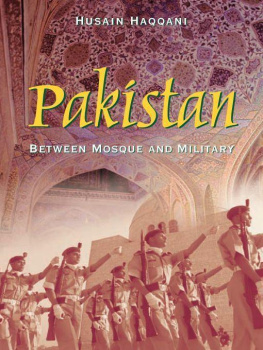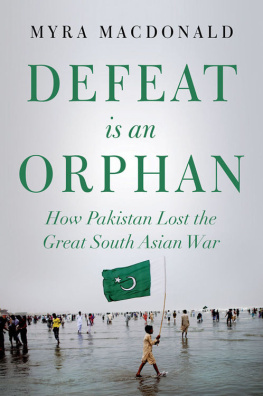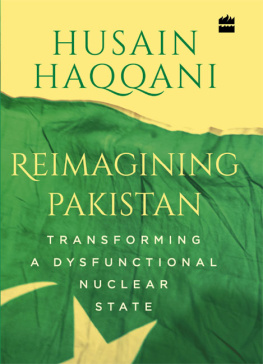
To my children
Huda, Hammad, Maha and Mira
And all the children of Pakistan
For whom the country needs to be reimagined
Contents
FEW FOREIGNERS VISIT PAKISTAN, but those who do often acknowledge the kindness and generosity of most of its 210 million people. Millions of Pakistanis living and working overseasas unskilled labour in the Middle East, cab drivers and factory workers in Europe and doctors, engineers, bankers or other professionals in North Americahave a reputation for hard work and efficiency. But that does not suffice to alter Pakistans description around the world as dangerous,
It is not difficult to understand the frustration of Pakistanis, both at home and in the diaspora, over the negative portrayal of their country. They are hurt by adverse comments about anything to do with Pakistan because it reflects poorly on them even though they and their friends and family lead decent, productive lives.
Pakistanis are a pious, warm and hospitable people, wrote Richard Leiby, a Washington Post reporter who spent a year and a half there, lamenting that the news from Pakistan did not reflect that. He noted, however, that the bad news about Pakistan was not untrue. In his view, Just like average Americans, the simple Pakistani people pay the price of their leaders magnificent mistakes.
The harsh fact remains, however, that scholarly and media discussion of any country focuses on its politics and policies more than on the virtues of its people. Objective analyses cannot ignore the disconcerting highlights of Pakistans seventy-year history: four full-fledged wars, one alleged genocide, loss of half the countrys land area in conflict, secession of the majority population, several proxy or civil wars, four direct military coups, multiple constitutions, long periods without constitutional rule, frequent religious and sectarian discord, repeated economic failures, numerous political assassinations, unremitting terrorism, continued external dependence and chronic social underdevelopment.
Some political scientists and historians described Pakistan, then comprising two wings separated by one thousand miles of enemy territory, as an oddity even in its early years. It was a nation unlike most others. Instead of shared language or even history, Pakistan was founded on the basis of a common religion, under institutions created during British colonial rule. This raised questions about the viability of ignoring ethnic and linguistic diversity; the potential for conflict between sects as well as between modernist and obscurantist definitions of Islam; and the cost of maintaining conflict with India in terms of economic development.
Still, soon after Independence, most journalists and scholars highlighted the hopeful aspirations of Pakistans leaders and scholars alongside those critical questions. The earliest books on Pakistan were written by Pakistanis, introducing their country to the world, who explained the creation of Pakistan in terms of HinduMuslim strife, described Pakistans potential as a Western ally and defined its strategic salience as well as its capacity to produce large numbers of soldiers.
There were also volumes by British authors, including former civil servants, who advanced the Pakistani account. They explained what they saw as the inevitability of Partition, given the withdrawal of Britains steadying hand and inexorable HinduMuslim differences. The martial virtues of West Pakistans Muslims as likely anti-communist warriors were extolled in an effort to persuade Western readers, particularly Americans, of the value of Pakistan as an ally in the years to come.
This genre of introductory books included Liaquat Ali Khans Pakistan: The Heart of Asia (Cambridge, MA: Harvard University Press, 1950); Lord Birdwoods India and Pakistan: A Continent Decides (New York: Praeger, 1954); Ian Stephenss Horned Moon (Bloomington: Indiana University Press, 1955), and Pakistan (New York: Praeger, 1963); Ishtiaq Hussain Qureshis The Pakistani Way of Life (New York: Heinemann, 1956) and The Struggle for Pakistan (Karachi: University of Karachi, 1965); and Aslam Siddiquis Pakistan Seeks Security (Karachi: Longman Greens, 1960).
North American academics started studying Pakistan as a political phenomenon in the late 1950s and throughout the 1960s. Their studies were published under neutral-sounding titles such as Keith Callards Pakistan, a Political Study (London: George, Allen and Unwin, 1957), Leonard Binders Religion and Politics in Pakistan (Berkeley: University of California Press, 1961) or Khalid Bin Sayeeds Pakistan: The Formative Phase (London: Oxford University Press, 1968).
Scholarship on Pakistan took a decidedly unfavourable turn after the 1965 IndiaPakistan war. Pakistans army was found insufficiently effective in that war and it attempted to save its reputation through media image-building. Its doctrine that the defence of East Pakistan lies in West Pakistan was exposed as hollow. Moreover, violent protests in both wings of the country resulted in the resignation of Field Marshal Ayub Khan, who had ruled for a decade with a semblance of stability, and his replacement in 1969 by General Yahya Khan as the new military dictator.
Civil war and genocide in erstwhile East Pakistan, which resulted in the creation of Bangladesh in 1971, added to uncertainty about both the idea and the prospects of Pakistan. The titles of books on Pakistan from that era reflect the outsiders scepticism. Herbert Feldman published From Crisis to Crisis (London: Oxford University Press, 1972) and The End and the Beginning (London: Oxford University Press, 1978); and L.F. Rushbrook Williams wrote Pakistan under Challenge (London: Stacey International, 1975). Lawrence Zirings Pakistan: The Enigma of Political Development (Boulder, CO: Westview Press, 1980) also painted the picture of a state in disarray.
One needs to look only at the cover of books about Pakistan published since the 1990s to realize that scepticism has since given way to apprehension and foreboding. Journalists and academics alike have extensively documented Pakistans embrace of extremist ideologies and its sponsorship of terrorist groups in the works published over the last twenty years. The newer studies reflect the concern of analytical minds about most aspects of Pakistans political orientation, from military intervention in politics to endemic corruption, from questions about nuclear security to its perennial difficulties in relations with its neighbours and the worlds major powers.
Books published over the last two decades feature titles like Allen McGraths The Destruction of Pakistans Democracy (New York: Oxford University Press, 1996), Christophe Jaffrelots Pakistan: Nationalism without a Nation? (London: Zed Books, 2002), Owen Bennett Joness Pakistan: Eye of the Storm (New Haven: Yale University Press, 2003), Mary Ann Weavers Pakistan: Deep inside the Worlds Most Frightening State (New York: Farrar, Straus & Giroux, 2010), Pamela Constables Playing with Fire: Pakistan at War with Itself (New York: Random House, 2011), Bruce Riedels Deadly Embrace: Pakistan, America and the Future of Global Jihad (Washington, DC: Brookings Institution Press, 2011), James Farwell and Joseph Duffys The Pakistan Cauldron: Conspiracy, Assassination and Instability (Washington, DC: Potomac Books, 2011), Christine Fairs Fighting to the End: The Pakistan Armys Way of War (New York: Oxford University Press, 2014), and Tilak Devashers Pakistan: Courting the Abyss (New Delhi: HarperCollins, 2016).
Next page
